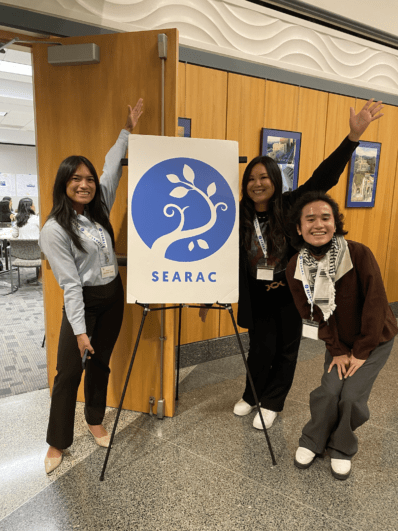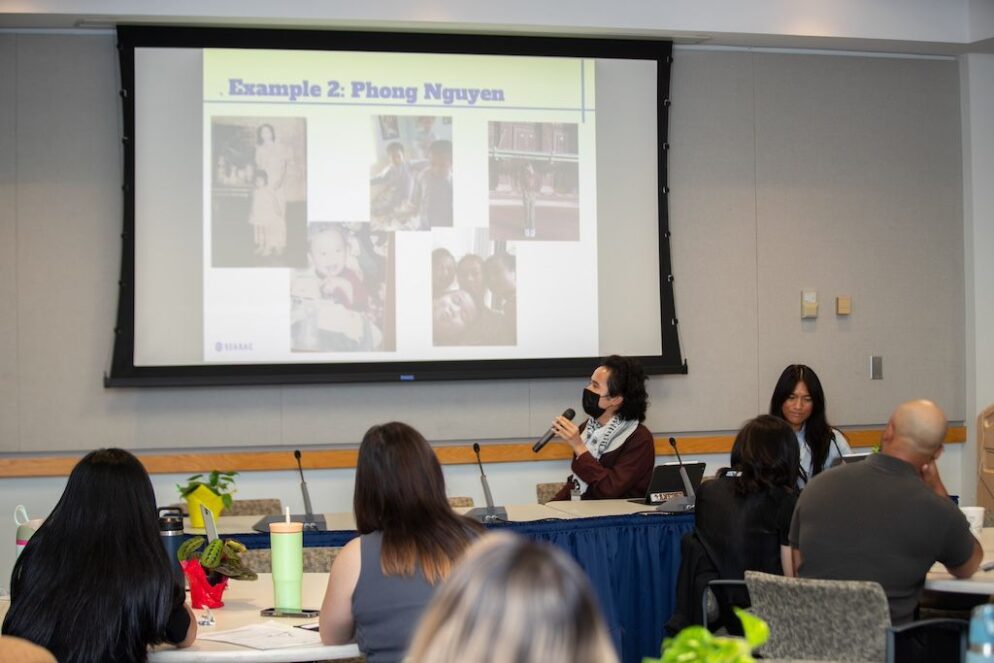By Phong Nguyen
Stepping into SEARAC’s Leadership and Advocacy Training (LAT) program, I was eager to immerse myself in a community of like-minded individuals. As a 1.5 generation immigrant from Da Nang, Vietnam, who arrived in the United States with my mom in 2007 at the age of four, I have always been deeply invested in understanding and addressing the complexities of the U.S. immigration system. This passion led me to join the immigration track, expertly facilitated by Kham S. Moua, SEARAC National Deputy Director, and Oliver Merino, Immigrant Justice Network Coordinator at Immigrant Legal Resource Center (ILRC).
Throughout LAT, I was energized by the passion and enthusiasm of the participants. Mini communities formed naturally, bound by shared goals and experiences. I had the privilege of co-facilitating a workshop with Phun H, SEARAC Communications Associate, on the “Story of Self, Story of Us, Story of Now.” This workshop was designed to help participants reflect on a pivotal moment in their lives that propelled them into the advocacy space. It was a crucial preparation for the final day of LAT, where groups would lobby for their chosen bills. Crafting and sharing a compelling personal story with legislative aides is an art, one that I practiced by revisiting my high school testimony for the Teaching Equitable Asian American Community History (TEAACH) Act. Although my testimony was successful, I remembered how mentally exhausting it was to present it to influential lawmakers. Phun and I emphasized the importance of taking care of ourselves and each other as we engaged in this deeply personal work. Advocacy often requires us to dig deep into our personal histories, and it’s crucial to do this in a way that doesn’t burn us out. Recognizing our limits is essential to sustaining our collective power.
Kham and Oliver, both experienced in immigration advocacy, set the tone for an inclusive and supportive environment from the start. One of the most impactful moments was the “Walk into the circle if…” exercise. During this activity, Kham read out prompts like, “Walk into the circle if you’re an immigrant” and “Walk into the circle if you know someone who has been deported.” This exercise beautifully grounded the group, highlighting the diverse backgrounds and experiences each of us brought into the space. It was a powerful reminder of the varied journeys that converged at LAT and the collective strength we held.

The culmination of LAT was the legislative meetings, where participants had the opportunity to persuade staff to support their initiatives. As the Communications Intern, I accompanied Kham’s Immigration group, documenting the stories of participants. However, my thoughts were split between my role and the broader political context. Just days earlier, Israeli Prime Minister Benjamin Netanyahu had addressed Congress, praising the U.S. for its support of Israel. Walking through the same corridors that had recently hosted Israeli Prime Minister Benjamin Netanyahu, I found myself meeting with the offices of elected officials who had given him a standing ovation upon his arrival. Many of these offices displayed signs that read “We stand with Israel” at their doors. It felt jarring and unsettling to enter these spaces, which felt hostile to me. I couldn’t help but think about how our fight for liberation, including Southeast Asian American liberation, is deeply connected to the struggle for Palestinian freedom. In those moments, I kept asking myself, “How can we ensure that our advocacy efforts also center the Palestinian cause?”
As a Vietnamese-American immigrant, being part of LAT 2024 was incredibly fulfilling. It provided a space where Southeast Asian American knowledge and community were celebrated. I left the program feeling inspired by the passion and dedication of my fellow participants. This experience reinforced my commitment to advocacy and the power of working together to create meaningful change.
Phong Nguyen (he/him) is a 2024 OCA Intern and was placed at SEARAC as our Summer 2024 Communications Intern. He is a rising senior at Stanford University, majoring in Asian American Studies and minoring in Human Rights. Born in Vietnam, he has spent most of his life in Chicago, gaining extensive experience advocating for the Asian American community and expanding access to Asian American Studies in PK-12 education.

